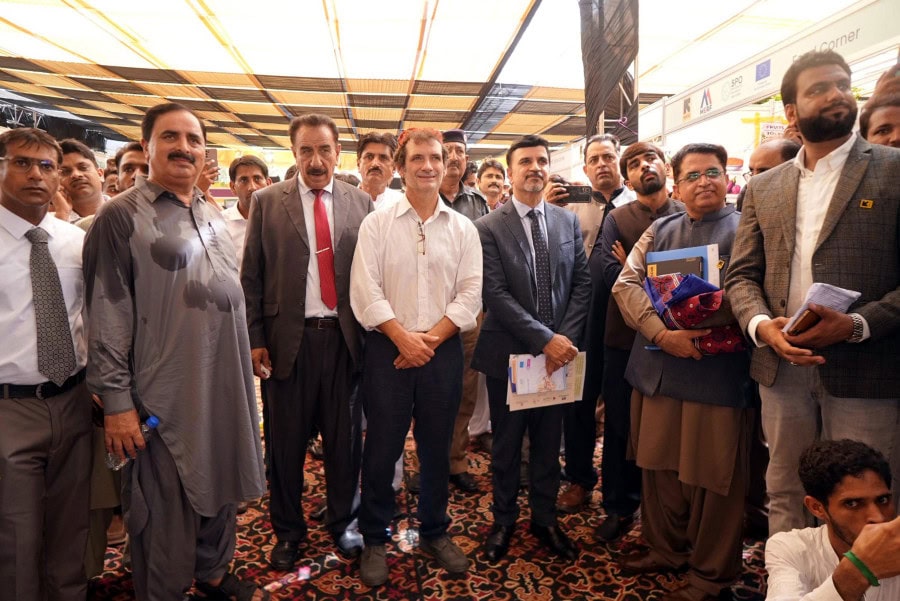A two-day event titled “Nutrition Care Synergies Experience Sharing and Innovations Showcase” was held at Shah Abdul Latif University (SALU), Khairpur, by International Rescue Committee (IRC) in collaboration with Department of Health Sindh, Accelerated Action Plan Taskforce (AAP TF), Strengthening Participatory Organization (SPO) and Medical Emergency Resilience Foundation (MERF).
The Nutrition Exhibition and experience sharing event brought together experts and stakeholders from various government, UN, and International, national and local non-government organizations to discuss strategies, innovations, and experiences in combating malnutrition in Pakistan.Organized in the frame of the EU funded Project “Strengthening Local Civil Society and Community-based Organisations and their Capacity in the Nutrition Sector in Sindh” with the aim of fostering collaboration and learning, the event provided a platform for sharing best practices in nutrition care and service delivery.The event featured keynotes and presentations from leading experts and community leaders, including representatives from the Department of Health Sindh, Accelerated Action Plan Taskforce (AAP TF), Lady Health Worker Department, PPHI, UNICEF, WHO, Agha Khan Health Service, Pakistan, VIAMO, Aga Khan University, IRC, SPO, MERF, SRSO and SIEHSs who deliberated on indigenous and innovative solutions.
The event also provided opportunity to local civil society organizations, service departments, communities, youth and other humanitarian actors to share their experiences and learning around nutrition programming in Sindh. The event provided an opportunity to exchange learning through stalls from various organizations, CSOs, academia, theater performance, seminars and interaction with experts. Speaking at the event, Mr Carlo De Rosa, Development Advisor for Rural Development and Nutrition at the EU delegation to Pakistan, noted that “The exhibition highlights the critical need for synergy among all partners and Civil Society Organizations involved in nutrition programming.
By sharing experiences and integrating innovative technologies, we can better address malnutrition.” He further noted that the role of academic institutions is crucial in bringing forth innovative ideas and adds immense value to programming.
Dr Sahib Jan Badar, representing AAP TF presented an overview of Accelerated Action Plan Taskforce achievements and reaffirmed the support of Government of Sindh and stated “The European Union funded CSO strengthening initiative is aligned with the Government of Sindh multi-sectoral Accelerated Action Plan for improved nutrition. Local CSOs are the heart and soul of our communities, and it is through their tireless efforts that we can collaboratively combat malnutrition.”Dr. FarhanaMemon, Director Lady Health Worker Program highlighted the importance of nutrition among children and pregnant and lactating mothers and highlighted that now it’s time to deliver results with commitment.
She shared experiences in strengthening services and assured full support to combat malnutrition.Vice Chancellor (SALU) Professor Dr. YousufKhushk applauded this initiative for bringing together diverse stakeholders to address the critical issue of malnutrition in Pakistan. He assured commitment to not only fostering research but also piloting academic courses on malnutrition to equip future generations with the knowledge and skills needed to combat this pressing challenge. A panel discussion on leveraging technology to combat malnutrition through the innovations to access hard-to-reach areas and leveraging upon technology showcased on real-world experiences, shared insights from the field. In conjunction to the importance of tech solutions the IRC under EU funded project presented 250 Android Tablets for Strengthening Information Management System to PPHI Sindh.The exhibition featured a range of interactive activities aimed at fostering collaboration and raising awareness about nutrition care.
One of the key highlights was the exhibition of stalls and booths where participants from civil society organizations, UN agencies, I/NGOs, government departments, and private sector companies displayed their programming and services. This provided attendees with a comprehensive look at the diverse efforts being undertaken to address malnutrition.Additionally, service and product demonstrations offered participants hands-on insights into nutrition-related services and innovations.
These interactive sessions allowed attendees to explore practical solutions that could be implemented to improve nutrition care. Educational materials such as brochures and leaflets were also distributed to raise awareness and inform stakeholders about best practices in nutrition service delivery. DrRanomanlLohano, Program Coordinator at IRC, reflected on the need for community-driven solutions and said, “Malnutrition is a complex issue that requires not only technical interventions but also the engagement of local communities.
Our work highlights the importance of grassroots involvement in tackling this crisis and ensuring sustainable improvements in health outcomes.”In Pakistan, the European Union’s support to nutrition commenced with humanitarian assistance after the 2010 floods. Since 2013 this assistance has taken a long‐term and sustainable perspective by assisting public departments to deliver nutrition services, within a clear and efficient policy framework.
The EU assistance has greatly contributed to the improvement of nutrition. Through the EU supported Strengthening Local Civil Society and Community-based Organisations and their Capacity in the Nutrition Sector in Sindh Project, IRC, MERF and SPO are reinforcing the capacity of 15 local organizations through technical and financial support to foster policy dialogues aimed at informing policy makers with evidence-based findings to shape policies that ultimately help improve health and nutrition services for the most deserving communities.









